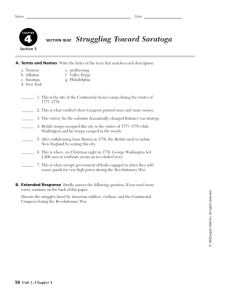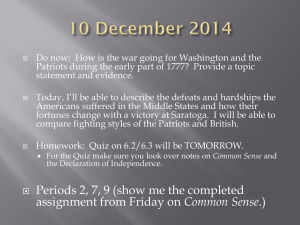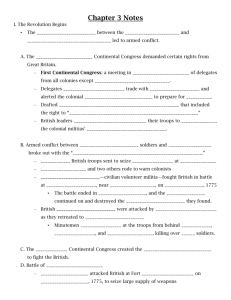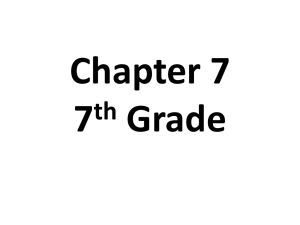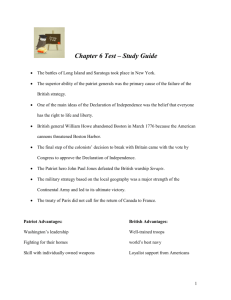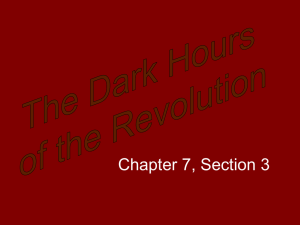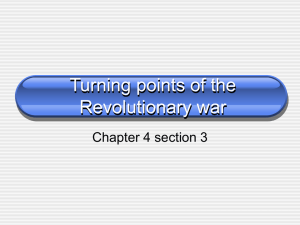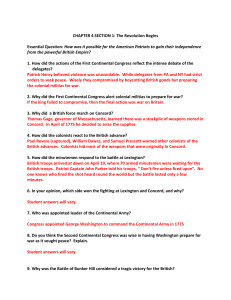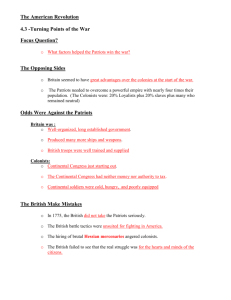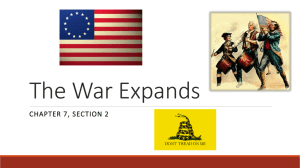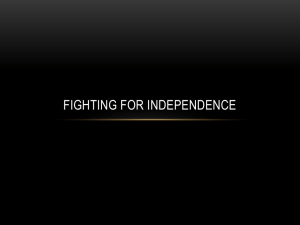The War for Independence Reading Part 2
advertisement
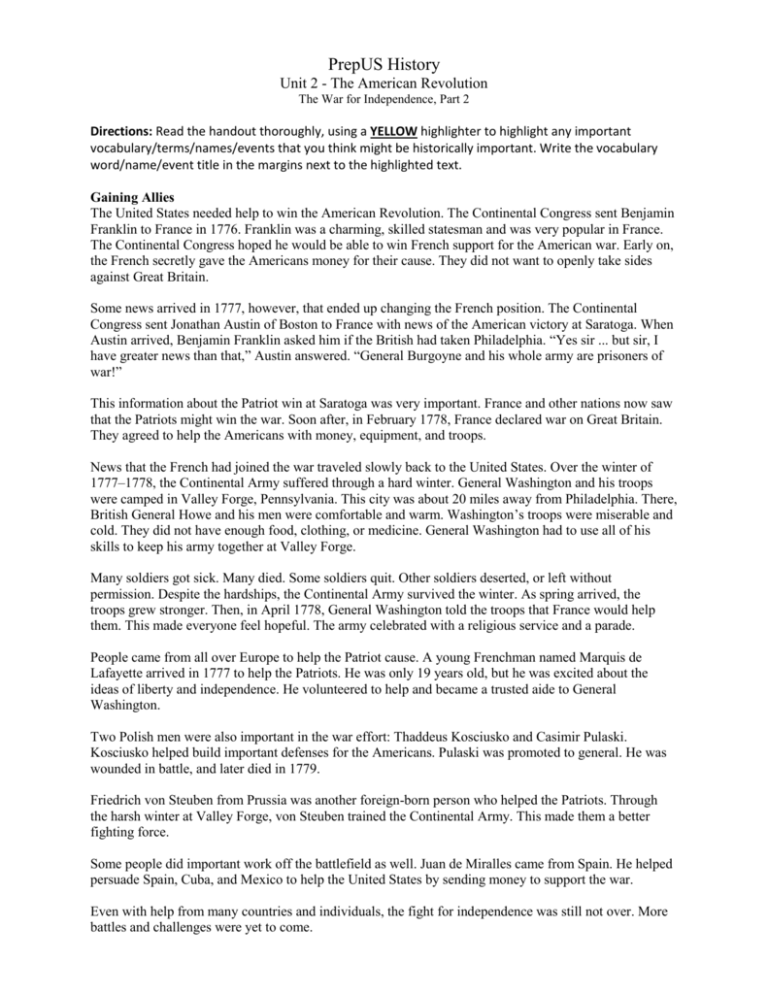
PrepUS History Unit 2 - The American Revolution The War for Independence, Part 2 Directions: Read the handout thoroughly, using a YELLOW highlighter to highlight any important vocabulary/terms/names/events that you think might be historically important. Write the vocabulary word/name/event title in the margins next to the highlighted text. Gaining Allies The United States needed help to win the American Revolution. The Continental Congress sent Benjamin Franklin to France in 1776. Franklin was a charming, skilled statesman and was very popular in France. The Continental Congress hoped he would be able to win French support for the American war. Early on, the French secretly gave the Americans money for their cause. They did not want to openly take sides against Great Britain. Some news arrived in 1777, however, that ended up changing the French position. The Continental Congress sent Jonathan Austin of Boston to France with news of the American victory at Saratoga. When Austin arrived, Benjamin Franklin asked him if the British had taken Philadelphia. “Yes sir ... but sir, I have greater news than that,” Austin answered. “General Burgoyne and his whole army are prisoners of war!” This information about the Patriot win at Saratoga was very important. France and other nations now saw that the Patriots might win the war. Soon after, in February 1778, France declared war on Great Britain. They agreed to help the Americans with money, equipment, and troops. News that the French had joined the war traveled slowly back to the United States. Over the winter of 1777–1778, the Continental Army suffered through a hard winter. General Washington and his troops were camped in Valley Forge, Pennsylvania. This city was about 20 miles away from Philadelphia. There, British General Howe and his men were comfortable and warm. Washington’s troops were miserable and cold. They did not have enough food, clothing, or medicine. General Washington had to use all of his skills to keep his army together at Valley Forge. Many soldiers got sick. Many died. Some soldiers quit. Other soldiers deserted, or left without permission. Despite the hardships, the Continental Army survived the winter. As spring arrived, the troops grew stronger. Then, in April 1778, General Washington told the troops that France would help them. This made everyone feel hopeful. The army celebrated with a religious service and a parade. People came from all over Europe to help the Patriot cause. A young Frenchman named Marquis de Lafayette arrived in 1777 to help the Patriots. He was only 19 years old, but he was excited about the ideas of liberty and independence. He volunteered to help and became a trusted aide to General Washington. Two Polish men were also important in the war effort: Thaddeus Kosciusko and Casimir Pulaski. Kosciusko helped build important defenses for the Americans. Pulaski was promoted to general. He was wounded in battle, and later died in 1779. Friedrich von Steuben from Prussia was another foreign-born person who helped the Patriots. Through the harsh winter at Valley Forge, von Steuben trained the Continental Army. This made them a better fighting force. Some people did important work off the battlefield as well. Juan de Miralles came from Spain. He helped persuade Spain, Cuba, and Mexico to help the United States by sending money to support the war. Even with help from many countries and individuals, the fight for independence was still not over. More battles and challenges were yet to come. Life on the Home Front The war affected the lives of everyone in the United States. Getting money to pay for the war was a challenge for the government. It printed millions of dollars of paper money. But the paper money lost value. The economy suffered from inflation. It took more and more money to buy the same amount of goods. Women raised their children and took care of their homes on their own. They also ran businesses and farms while their fathers, husbands, and brothers were away at war. Children lived without their fathers present. This caused some people to think differently about women’s roles. Abigail Adams, the wife of Congressman John Adams, wrote to ask him to think about the rights of women as he helped form the new nation. For others, the fight for freedom made them change their thoughts about slavery. In 1778, the governor of New Jersey, William Livingstone, asked his state government to free all enslaved people. He felt that slavery went against the ideas of Christianity. African Americans also spoke up for their freedom. The conflict over slavery would continue for many years to come. The war also affected another group of people in the United States. These people were Loyalists, or American settlers who supported Great Britain. Some Loyalists joined the British troops and fought against the Patriots in the war. Some were spies for Great Britain. Others fled to Canada or went back to Great Britain. The people who stayed faced trouble. Many were treated badly by their neighbors. Some were attacked or hurt. Those caught spying could be arrested or even put to death. NOW - go back through the reading and use a DIFFERENT COLORED highlighter to highlight the portion of the text that answers each of questions below, marking the text with the question number. If you already highlighted the text that answers a question in yellow, just write the question number in the margin next to it (you do not need to highlight it again in the other color). 1. Why was the Battle of Saratoga an important victory for the Patriots? 2. Why did some American soldiers decide to desert during the winter of 1777–1778? 3. Why would foreign-born people come to help the Patriots in their fight for freedom? 4. How did Lafayette help the Patriot cause? 5. What help did the Patriots receive from Spain? 6. Who were two of the people mentioned in the text from other nations who helped the United States gain freedom? What did each contribute? 7. What were two groups of people who sought greater freedom as a result of the Revolution? 8. How were Loyalists treated by the Patriots during the war? 2
